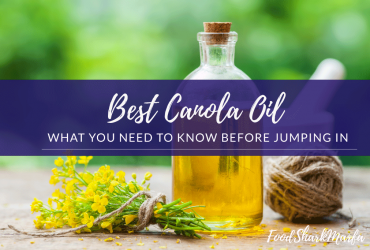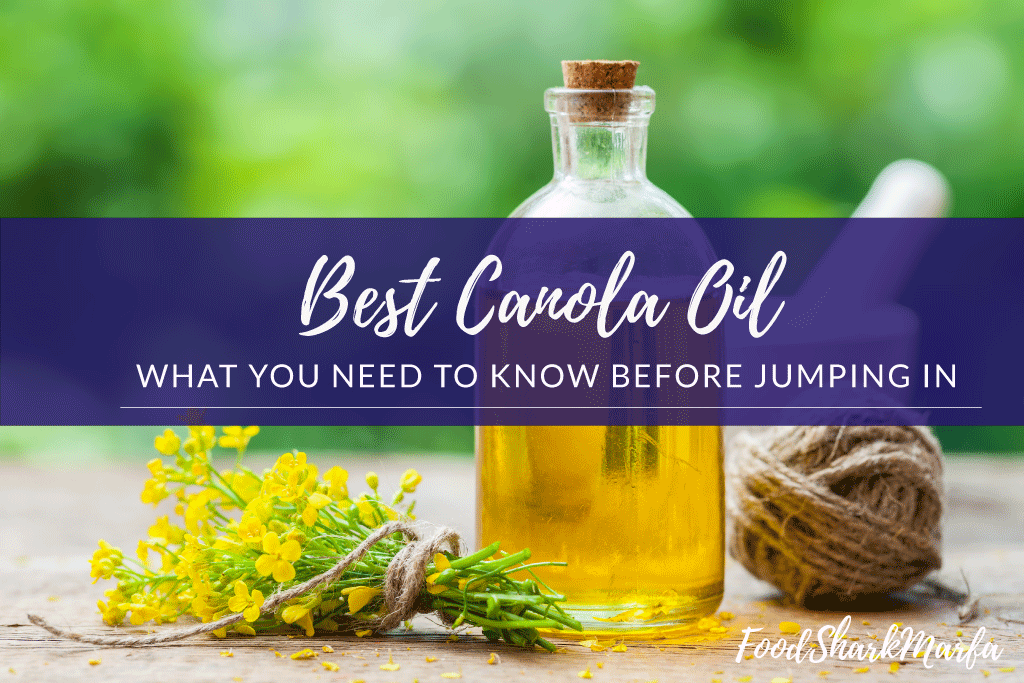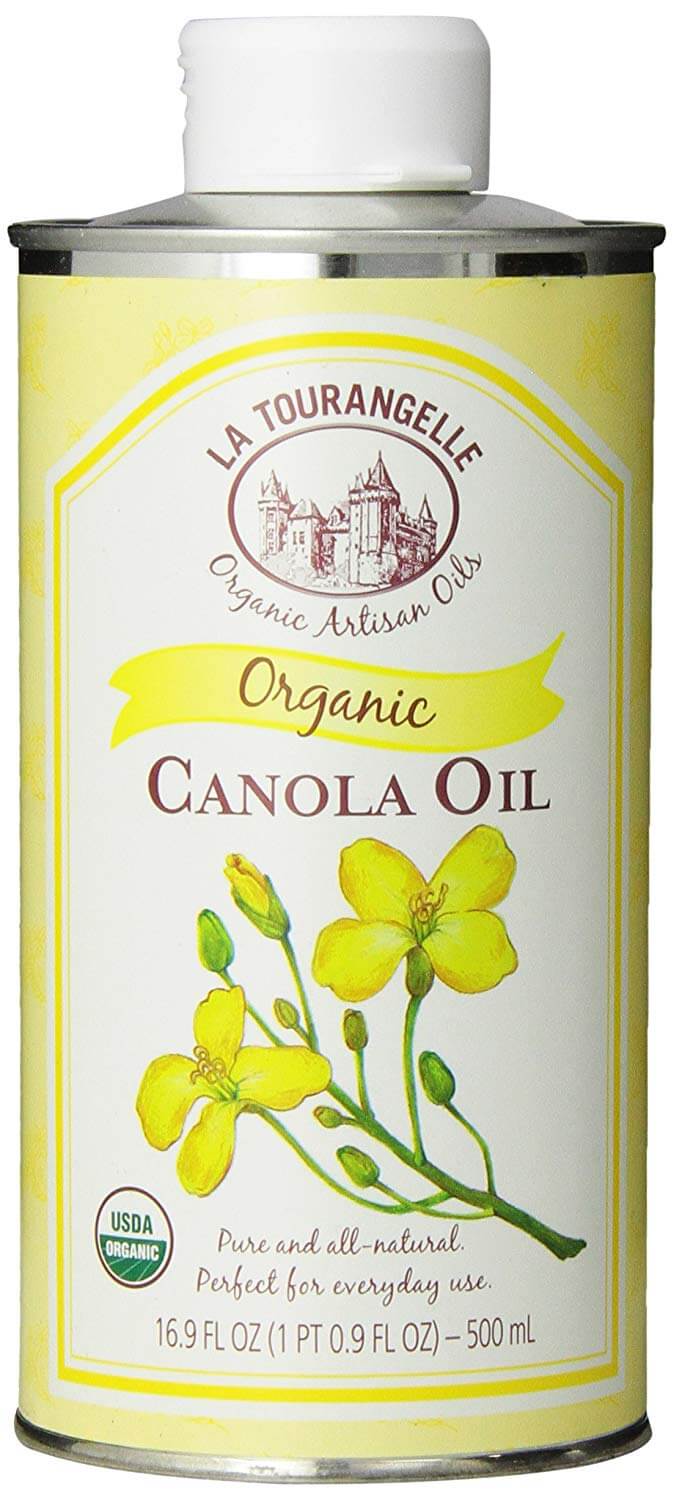If you are looking for a truly versatile oil, then canola oil may just be your best bet! Suitable for frying and baking with, its neutral taste ensures it will not overpower the other flavors in your dish. Canola oil is not without controversy though, as much of the canola oil available to us is from plants that have been genetically modified.
In this article we take a look at exactly what canola oil is and why it was selectively bred into the plants that the oil is extracted from today. We also look at some of the debate around whether canola oil is a heart healthy oil and to assist you in your choice of canola oil, we also review a range of the best canola oils, including a selection which are non-GMO and organic.Quick Comparison: Top 10 Best Canola Oils
1. Happy Belly Canola Oil
The Happy Belly canola oil is a light tasting oil containing a total of 14 grams of fat per serving and 0 grams of trans fat. Coming as a large 128 fl. oz/one gallon container with a carry handle, this is a pure canola oil which does not contain any preservatives. Suitable for any cooking or frying, this oil also comes with a satisfaction guarantee. As a larger bottle, this can be more awkward to pour from and the odd buyer considers it would be better if it came in a thicker plastic bottle
Pros
Cons
2. Crisco Pure Canola Oil
With its light flavor and texture, Crisco pure canola oil is a versatile oil that is ideal for dressings and marinades as well as for baking and frying with. This 48 fl. oz bottle of canola oil does not contain any preservatives or additives. Although this oil is gluten free, it is not certified gluten free. The design of the bottle can make it a little difficult to pour out from.
Pros
Cons
3. Butter Flavored Canola Oil by Amish Country Popcorn
The 16 fl. oz bottle of Amish Country Tenderpop canola oil has been grown, manufactured and packaged in the US. This is a non-GMO oil which is also gluten free, kosher and vegan. It is also free from tree nuts. This oil has a buttery flavor, making it ideal for popcorn.
This canola oil also contains butter flavored beta carotene, TBHQ and citric acid which acts to prevent oxidation of the oil. Some buyers are disappointed to find that this contains TBHQ and some have commented that they do not think it has a buttery taste as advertised.Pros
Cons
4. La Tourangelle Organic Canola Oil
Suitable for cooking with and for using in dressings and sauces, the La Tourangelle organic canola oil is produced using artisan French traditions. This oil is sourced from European expeller-pressed non-GMO organic canola plants and is certified USDA organic.
Available as a 16.9 fl. oz can or 128 fl. oz plastic bottle, this does not contain any preservatives. As the smaller size does come in a can there can be a risk of it being damaged during shipping and as an imported organic oil, it does cost more than that produced in the US or Canada.Pros
Cons
5. 365 Everyday Value Canola Oil
The 32 fl. oz bottle of 365 Everyday Value canola oil is Non-GMO Project Verified as well as being certified kosher and vegan. This is a pure oil which does not contain any additives or preservatives and is suitable for baking and frying with as well as using in dressings and marinades.
As a smaller bottle, it is not as good value for those households who use a lot of canola oil and although non-GMO; this is not an organic oil.Pros
Cons
6. Snappy Buttery Canola Oil
The one gallon bottle of Snappy Buttery Canola Oil is a popping oil ideal for making popcorn at home. This contains natural coloring in the form of beta carotene to add color to your popcorn and it also contains artificial butter flavor. This oil is not recommended as being used as a topping oil. It does not contain any preservatives.
The odd buyer is not as keen on the taste of this oil and some consider that this does not contain as much butter flavor as they would like.Pros
Cons
7. Healthy Harvest Canola Oil
The Healthy Harvest Canola Non-GMO Oil is Non-GMO Project Verified and produced and bottled in the US. This is an expeller-pressed pure oil that has been physically refined without hydrogenation or chemicals and comes as a one gallon plastic bottle which is BPA-free. This is also certified kosher.
Suitable for frying and baking with, you can also use this for sauces and marinades. This is a larger bottle which may be too large for some households, and although non-GMO, it is not certified organic.Pros
Cons
8. Dutchman’s Buttery Canola Popcorn Oil
The Dutchman’s Buttery Canola Popcorn Oil is a popping canola oil ideal for theater-style popcorn at home. This is colored with natural beta carotene to give the popcorn more color along with artificial butter flavor. This is certified kosher and is also considered gluten free, vegan and lactose free.
This comes as a 33.8 fl. oz bottle and can also be used as a topping oil as well as a popping oil. The odd buyer has found this has not lasted as long as they would have liked, and some consider it did not have quite as much flavor as they expected.Pros
Cons
9. Wesson Pure Canola Oil
The pure Wesson canola oil is a light and delicate oil suitable for using for cooking with and more. Coming as a family-sized 1.24 gallon container, this is a pure oil that does not contain any additives and preservative. There can be a small risk of the bottle leaking during shipping.
Pros
Cons
10. Spectrum Culinary Organic Canola Oil
The expeller-pressed Spectrum Culinary organic canola oil is a refined oil. As well as being certified USDA organic, this is also Non-GMO Project Verified and kosher. Coming as a 32 fl. oz glass bottle, this is a premium canola oil which you can cook with up to a temperature of 450°F.
Pros
Cons
Things to Consider Before Buying Canola Oil
Canola oil is classed as a vegetable oil; although oils sold as vegetable oil are usually a blend of plant-based oils such as soybean.
The neutral flavor and higher smoke point of canola oil makes it ideal for all cooking uses, as well as for sauces, marinades, dressings and more.
The Canola Plant
The canola plant is physically identical to the rape or rapeseed plants (Brassica napus, Brassica rapa), but unlike rape plants, the canola plant is safe for human consumption and contains different nutrients. Both rape and canola plants are also known as oilseed plants.
The name ‘rape’ derives from rapum, which is the Latin word for turnip; which it is related to. Both rape and canola belong to the same plant family as mustard and other cabbage plants. For ease of reading in this article, we will refer to the plants that produce canola oil as being canola plants!
Canola oil is extracted from the seeds of the canola plant which can be a cultivar of various species of rape plants such as Brassica napus L, Brassica rapa subsp. or Brassica juncea) or ‘any other seed of the genus Brassica from which the oil shall contain less than 2% erucic acid….’ (Canola Council of Canada)
Canola plants are grown in some areas of the US, but much more extensively in Canada, Europe and Australia. Canola plants have small yellow flowers that develop into pods containing the small black seeds that are processed to produce the oil.
How Canola Plants Evolved from Rape Plants
Although oil from rape plants has been used for thousands of years, it was rarely consumed due to its taste.
In 1974, after a program of selective breeding in Germany, the levels of erucic acid in rape plants – which was toxic and bitter tasting – was reduced to a level that made human consumption of rape oil safe.
Not long after this, a Canadian summer rape plant was found to have naturally low levels of erucic acid, as well as lower levels of other unwanted compounds – glucosinolates. As a result, selective breeding was used to evolve these rape plants further. These rape plants with lower levels of erucic acid and glucosinolates were given the name ‘canola’ from ‘Canada’ and ‘ola’, which means oil and so, the canola plant was ‘born’.
Other selective breeding of canola plants was carried out through traditional methods to develop high oleic canola oils that could be used in the food industry rather than artificial trans fats.
The term ‘Rapeseed 00’ is given to the genetically modified strains of rape plants that are today’s canola plants. Around 80% of Canadian canola plants have been modified through the use of biotechnology to allow less chemicals to be applied to the crop fields to keep weeds and other pests under control.
Although a canola plant may have been genetically modified, the oil from the plant has not. Genetic modifications to canola plants usually occur in one gene and as genes are proteins, when canola oil is processed, any proteins are naturally removed from the oil.
The use of genetically modified organism of GMO crops in foods are a concern for more than a few of us. Although viewed as safe by many in the scientific community, there is still little data available to allow any potential health risks to be identified.
This means a number of us will avoid GMO crops because of our concerns around how they may affect our health and the environment long term.
The good news is that there a number of certified organic and/or non-GMO canola oils available on the market.
How Canola Oil is Extracted
Expeller-pressed canola oil has been extracted manually from the seeds of the canola plant and the leftover canola is then sold as animal fodder. This may take place at a higher temperature to allow more oil to be extracted from the seeds.
Some canola oils may be extracted through the use of solvents such as hexane to release more oil from the seeds, although the hexane does not remain in the oil after it has been used in the extraction process.
Canola oil is usually refined further to remove other components. This extra refining gives a more neutral tasting oil which shelf stable and can often be heated to a higher temperature than an oil that has been cold pressed. Also known as an RBD (refined, bleached and deodorized) oil, this will usually contain lower levels of nutrients such as vitamins, antioxidants and fatty acids than a cold pressed oil.
Safety and Nutrition of Canola Oil
Canola oil is recognized as Generally Regarded as Safe (GRAS) for human consumption, including in the use of baby formula. High oleic canola oil can also carry a qualified health claim from the FDA for its ability to reduce coronary heart disease risk when used in place of saturated fat in the diet.
A tablespoon of canola oil will contain around 12% of our RDI (Reference Daily Intake) of vitamins E and K and 124 calories.
It contains 7% saturated fat, 64% monounsaturated fat (MUFA) in the form of oleic acid and 28% polyunsaturated fat, which is around 10 grams less saturated fat per tablespoon compared to a typical vegetable oil.
Some canola oils may contain up to 4.2% trans fat, but most are usually lower, or may even be free from trans fat.
The polyunsaturated fat in canola oil is made up of linoleic acid (or omega-6 fatty acid) and ALA, an omega-3 fatty acid. ALA is converted into DHA and EPA, which can help to protect us against the risk of type 2 diabetes, heart disease and even the risk of fractures.
The higher levels of omega-6 fatty acids found in canola oil and many refined foods can cause an imbalance with the lower levels of omega-3 fatty acids obtained from whole foods. Ideally, the ratio of omega-6 fatty acids to omega-3 fatty acids in our diet should be 1:1, but an average Western diet is estimated to have a ration of around 15:1.
This imbalance can contribute to increased inflammation in the body which is linked to obesity, heart disease and Alzheimer’s disease.
Cooking with Canola Oil
As well as its light color and neutral flavor that does not alter the taste of baked goods, canola oil is easy to mix with other ingredients to give moist foods with soft texture.
You can use canola oil in place of solid or melted solid fat in a recipe, which will reduce the amount of total fat in the recipe by up to 25% as well as reducing saturated fat and trans fat levels. This handy table will help you to convert recipe fat quantities to the correct volume of canola oil.
If you are replacing vegetable oil with canola oil, then you can just use the same amount.
Canola oil is also suitable for sautéing with as well as deep frying. If you deep fry, then keep the temperature at 375°F, although the smoke point of fresh (not been used before) canola oil is around 468°F, some other estimates suggest it can be a lower smoke point of around 400°F.
It can also be used in dressings and marinades as it gives smoothness and its neutral flavor means that the taste of the other ingredients will still be able to come through. Canola oil also makes an ideal animal or dairy fat replacement for vegan recipes.
Canola oil is shelf-stable, but it will usually keep for longer (around 12 months) if refrigerated after opening. Otherwise, store it in a cool and dark place before and after opening.
Research into Canola Oil and Possible Heart Health Benefits
At present, there are few long term studies available on the impacts of canola oil. Some of the published studies on the benefits of canola oil may also be sponsored by the canola industry. There can also be a difference between the types of canola oil used in the research, with some studies using unrefined canola oil, while most oils available to us are refined canola oils.
Some research suggests canola oil is beneficial for the heart because it contains higher levels of MUFA which have been shown to regulate fat levels in the blood, improve insulin sensitivity and reduce oxidation levels of LDL (‘bad’) cholesterol which is a precursor of fatty plaque formation in our blood vessels.
At present, there is no evidence to show that canola oil is any better or more effective at reducing LDL cholesterol levels compared to other oils that are a good source of MUFA, but many do agree that the use of canola oil or similar plant-based oils in place of saturated fats in the diet is helpful to our health.
However, one 2018 study showed that those obese or overweight adults who used canola oil for cooking with were more likely to have metabolic syndrome than those study participants who used very little or no canola oil in their diet. Metabolic syndrome is a group of conditions such as high blood pressure, high cholesterol, high blood sugar and excess belly fat, which when they occur together increase the risk of heart disease.
Conclusion
In this article we have looked at the evolution of canola oil and why it is perhaps one of the most contentious forms of oil. We have also considered why canola oil is sometimes promoted as a heart healthy oil and we have also offered a few tips to help you make the most of canola oil whether baking, frying or using in marinades or dressings.
We hope you have enjoyed our article on canola oil and that our reviews of a selection of the best canola oils, including a number which are organic and/or non-GMO, has given you the option to choose the type of oil that best suits your requirements.













Actually the Crisco canola oil is the best. The Wesson has a flavor that can be noticeable when used with certain foods and the texture of the Crisco is better. I don’t know why they would call it budget. It is more costly than the Wesson.